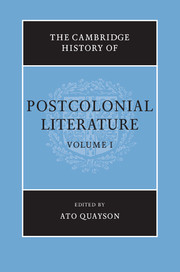Book contents
- Frontmatter
- 1 Introduction: postcolonial literature in a changing historical frame
- 2 Postcolonial fictions of slavery
- 3 Postcolonialism and travel writing
- 4 Missionary writing and postcolonialism
- 5 Postcolonial auto/biography
- 6 Orality and the genres of African postcolonial writing
- 7 Canadian literatures and the postcolonial
- 8 Postcolonialism and Caribbean literature
- 9 Postcolonialism and Arab literature
- 10 Postcolonialism and postcolonial writing in Latin America
- 11 Postcolonial writing in South Africa
- 12 Postcolonial literature in Southeast Asia
- 13 Postcolonial South Asian poetry
- 14 Postcolonial writing in India
- 15 Postcolonial writing in Australia and New Zealand
- 16 Indigenous writing in Canada, Australia and New Zealand
- 17 Postcolonial writing in Ireland
- 18 Postcolonial writing in Britain
- 19 Postcolonial writing in France
- 20 Postcolonial writing in Germany
- References
11 - Postcolonial writing in South Africa
Published online by Cambridge University Press: 28 January 2012
- Frontmatter
- 1 Introduction: postcolonial literature in a changing historical frame
- 2 Postcolonial fictions of slavery
- 3 Postcolonialism and travel writing
- 4 Missionary writing and postcolonialism
- 5 Postcolonial auto/biography
- 6 Orality and the genres of African postcolonial writing
- 7 Canadian literatures and the postcolonial
- 8 Postcolonialism and Caribbean literature
- 9 Postcolonialism and Arab literature
- 10 Postcolonialism and postcolonial writing in Latin America
- 11 Postcolonial writing in South Africa
- 12 Postcolonial literature in Southeast Asia
- 13 Postcolonial South Asian poetry
- 14 Postcolonial writing in India
- 15 Postcolonial writing in Australia and New Zealand
- 16 Indigenous writing in Canada, Australia and New Zealand
- 17 Postcolonial writing in Ireland
- 18 Postcolonial writing in Britain
- 19 Postcolonial writing in France
- 20 Postcolonial writing in Germany
- References
Summary
South African history is characterized by multiple colonialisms and migrations which were different in the ways they operated and in their impact on the societies and cultures of the region. The large-scale movement of people, the rise and fall of polities, the logic of imperial control by direct and indirect means, and the history of resistance against such control – all were present before the arrival of European settlers in the seventeenth century. Dutch, French and German settlers and their descendants, who over time came to speak Dutch in its creolized local form, Afrikaans, were, in 1806, effectively recolonized by Britain. Large numbers of slaves were imported over centuries from other parts of Africa, Madagascar, Indonesia and Sri Lanka, adding to the mix. The advent of self-rule in 1910, the triumph of the National Party in 1948, or the declaration of the republic in 1961, moments which elsewhere might be iconically postcolonial, in South Africa meant the entrenchment of white power and an extension of internal colonial-style control and exploitation. South Africa thus presents a particular set of challenges to those seeking to describe it as ‘postcolonial’.
The variegated nature of South African colonialism is evident in its literatures. Writing in English and Afrikaans exhibits features similar to those of the literatures of other settler countries, for example in their transactions with European literary traditions, or in a preoccupation with the relations between identity and landscape. But South Africa differs dramatically from other settler colonies in that its settlers never outnumbered its indigenous inhabitants.
- Type
- Chapter
- Information
- The Cambridge History of Postcolonial Literature , pp. 329 - 351Publisher: Cambridge University PressPrint publication year: 2012
References
- 1
- Cited by



